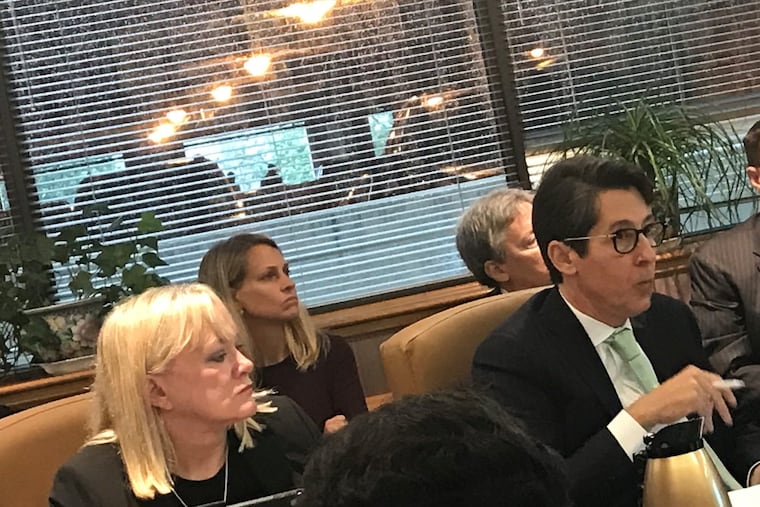PSERS, divided, votes to buy more hedge funds, real estate
Gov. Wolf's appointees to the board of Pennsylvania's largest pension split on whether to buy another $1.6 billion in private investments.

As the stock market sank last week, the teachers and public officials on the board that oversees Pennsylvania's largest investment fund — the $57 billion Public School Employees' Retirement System — wrestled over how to prepare for the threat of lower share prices, higher interest rates, faster inflation.
They didn't all agree. Even the two trustees appointed by Gov. Wolf, a Democrat, divided and canceled each other's votes on whether to buy another $1.6 billion in private investments and real estate for the pension system, which is funded by a mix of state and school property taxes, investment profits, and teacher contributions, and needs tens of billions more to cover its long-term obligations.
The two-day meeting started on a hopeful note: PSERS should be able to count on around $4 billion in ready cash, from new school district property tax collections and from investments to be cashed in, chief investment officer Jim Grossman told the board and assembled investment pitchmen. (Trustees are unpaid, though PSERS gave them a hot breakfast and other meals. Bowls of Hershey's candies adorned the board table.)
"I'm really glad to see" that $4 billion, said Joe Torsella, the state's elected treasurer, who in his campaign questioned the high fees paid to hedge, private equity, and real estate funds, and has advocated simpler investments, like indexed stock and bond funds (which PSERS also owns). Robin Wiessmann, the state banking and securities secretary, nodded agreement.
Of course, Torsella added, part of the cash was already committed to new investments. And, he pointed out, $250 million a month is flying out of PSERS in the form of checks to retired teachers, administrators, support workers.
Grossman noted PSERS assets collapsed from $70 billion to $40 billion in the last market crisis. Like other investors PSERS felt pressure to dump Treasuries as well as traded and private investments at discount prices, losing principal as well as income. Is the system better prepared now?
"How worried should we be?" Asked Torsella. And what should PSERS do? Where should it stash that $4 billion, for example?
Jeff Gardner came to the meeting from Connecticut — hedge-fund country — full of suggestions. Gardner works for a hedge fund — the largest U.S. hedge fund, Bridgewater Associates, founded by billionaire Ray Dalio and now managing $160 billion in other people's money. PSERS already invests with Bridgewater, and paid that firm more than $30 million in fees, last year alone.
Gardner was on the agenda providing a "Board Education" session. To this layman it looked like a sales pitch — for commodities, which can include oil, timber, pork, gold, or other tangible investments. Gardner called them "Inflation Protection," because, he said, their value sometimes goes up, even when stocks don't.
"Economists know we have recovered to a point where we are reaching to a different stage," Gardner told the trustees. "We are in the last stages of the cycle. … Abundant liquidity has pushed up asset prices. … Unemployment (is) approaching lows we haven't seen in a very, very long time. … There's a pickup in inflation. … Central banks have begun to cut back. … What assets are going to protect you this time?"
Wait a minute: Didn't the Trump tax cut stimulate the economy? asked trustee Jason Davis, a high school economics teacher in Pittsburgh.
"It's pushing us farther into the cycle" — the "late" part of the cycle, when stock and bond prices "are starting to struggle because of things like inflation" — and also the time when "commodities can do well," said Gardner knowingly.
"How do you calculate" how well these assets will do in these times? challenged Wiessmann, the banking secretary.
You look back, said Gardner: "Fifty-year returns, divided by the level of risk." He flashed columns of figures on a screen to support his argument that commodities, more often than not, but not always, did relatively better than stocks, in what turned out to have been inflationary periods.
The board didn't vote on a commodities proposal that day. It did consider seven others, submitted in previous meetings.
In an "executive session" closed to nonmembers, the trustees decided not to consider a proposal by top executives of a Pittsburgh company, Tulco LLC, which among other things sells hospital scrubs.
Then they passed — with two votes dissenting — proposals to invest a total of $1.5 billion in six other money managers: up to $200 million for Bain Capital Asia Fund IV (Chinese and Japanese companies); $400 million for TCI Real Estate Partners Fund III LP (U.S. and European office buildings); $200 million for the AKAZ Offshore Fund (stock and currency options contracts); $200 million for the Caspian Opportunistic Dislocation Strategy (distressed debt); $200 million for Triton Value Fund Cayman L.P. (small firms in northern Europe); $300 million in Brookfield Strategic Real Estate Partners III (properties in North America, Europe, Australia, Brazil, India).
Torsella and Wiessmann voted No to all those. "This is the same stuff we've had so many issues with. It's not really clear that it's advantageous" to PSERS, Michael Connolly, Torsella's spokesman, told me. Though he acknowledged "we don't have an exact counterproposal." But the board ought to wait until the state commission on investment fees — Torsella is the vice chair — issues its final report later this year, Connolly added.
While Wiessmann, Wolf's banking secretary, voted No, an aide representing Wolf's education secretary, Pedro Rivera, voted Yes on all those investments.
What does that say about Wolf's view, or his administration? Rivera and Wiessman know Wolf wants them to "get the best deals with the highest returns, and make sure that greatest return be returned to the Commonwealth and not be eroded in investment fees," the governor's spokesman, J.J. Abbott, told me.
Under those broad guidelines, Wolf's appointees sometimes "will disagree," he acknowledged.